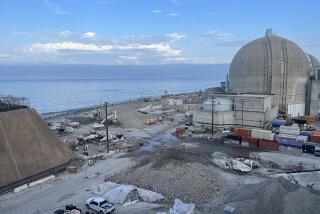N-Worker Checked for High Radiation : San Onofre Officials Believe Reading on 1 of 3 Exposure Badges May Be Error
- Share via
A worker at the San Onofre nuclear power plant may have been exposed to a dose of radiation that was as much as 27 times higher than that allowed under federal regulations, utility officials said Monday.
But because the man showed no signs of suffering from such an exposure and no one else working with him was exposed to abnormal amounts of radiation, plant officials are questioning whether the reading was accurate.
The machinist, whom plant officials would not identify, wore a badge on his right hand during a 15-day period that recorded a dose of 512 rem, a measurement of the effect of radiation on man. Two other radiation-measuring badges, on his left hand and on his chest, did not record abnormal amounts of radiation.
Federal regulations allow an exposure of 18.75 rem to a person’s extremities during a three-month period, and utility officials said no one at the plant had ever received more than about 20% of that amount.
If the machinist’s hand had been exposed to 512 rem, he might have been expected to suffer some hair loss or reddening on his hand. He reported experiencing neither symptom, and an examination by a company physician turned up no evidence of excessive radiation exposure. The same amount of radiation to the entire body would probably have caused immediate illness, and the worker said no such illness occurred.
Plant officials believe that a radiation particle may have become lodged in the man’s badge or that the badge may have been defective.
“We’ve never had an indicated exposure this high or one that even approached being this high,” said Harold Ray, a vice president of Southern California Edison Co. and manager of the seaside power plant. “At this time, we cannot account for that, and that’s one reason why we think there might be something peculiar or mysterious about the reading. But we will treat it as potentially valid until we satisfy ourselves that is not the case.”
Edison spokesman David Barron said the possible exposure was reported to the Nuclear Regulatory Commission on Friday, when laboratory results showing the reading were received by the company. The exposure would have taken place between Oct. 6 and Oct. 21, when the machinist was repairing a pump in reactor Unit 3.
The man worked in the contaminated area of the plant six times during those 15 days, and his longest single exposure to radiation was five hours.
Barron said the worker wore badges like rings on each hand. Over each badge he wore a cotton glove and two rubber gloves. He wore another badge on his chest under layers of protective clothing.
Each time the machinist came out of the contaminated area, the badge on his chest was checked for excessive radiation, and his body was checked again before he left the plant for the day. The badges on his hands were set aside and reused each time he entered the reactor containment building, then were sent to a lab to be checked when the job was finished, as is routine procedure.
Ray said the machinist has worked for Southern California Edison for at least four years and is experienced in working in contaminated areas of the plant. Pending completion of the investigation, the machinist will be barred from working in contaminated areas because he may have exceeded the federal limits for radiation exposure.
More to Read
Sign up for Essential California
The most important California stories and recommendations in your inbox every morning.
You may occasionally receive promotional content from the Los Angeles Times.












